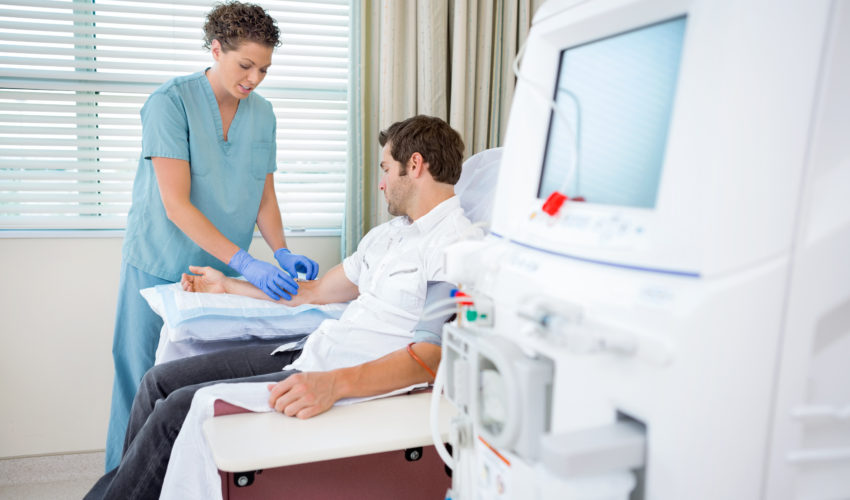Post Views: 4,012
ViewsDiabetic Gastroparesis: What Nurses Need to Know
By David Morrison, RN
Diabetic gastroparesis (DG) is a complication of diabetes that can result in damage to the vagus nerve that supports GI mobility and the ability to move food through the digestive tract (1,2,3). Individuals with diabetes mellitus have a great risk of developing this condition. This article will provide the basic pathophysiology, signs and symptoms, diagnosis, and current treatment recommendations for DG to help nurses be better prepared to care for patients impacted by this condition.
Pathophysiology
DG is also known as delayed gastric emptying (2). Delayed gastric emptying limits the function of smooth muscles in the digestive tract by slowing peristalsis that assists in gastric emptying (3). A complication of diabetic autonomic neuropathy, DG usually results from long-term, uncontrolled diabetes for type 1 and type 2 diabetics, which causes diabetic neuropathy (2). Damage to the vagus nerve, which supports gastric emptying, from poor glycemic control results in gastroparesis. Many times it is often diagnosed as heartburn or peptic ulcer disease (PUD) leading to inappropriate treatment.
Signs and Symptoms
Recognizing the signs and symptoms of DG is needed for proper treatment. Nurses provide the majority of care for patients with diabetes, so recognition of the signs of this condition is needed. Below are common signs and symptoms nurses need to be aware of:
- Nausea (most common);
- Bloating;
- Early satiety;
- Fluctuating glucose readings;
- Constipation and/or diarrhea;
- Postprandial fullness;
- Abdominal pain and;
- Weight loss or gain (1,2,3).
Diagnosis
The American College of Gastroenterology (ACG) guidelines for the diagnosis and management of DG report a combination of symptoms and signs is required to establish the diagnosis of DG1. The following are common procedures used to establish a strong correlation for determining if a patient has DG:
- Testing to rule out evidence of ulcer or mechanical obstruction (first step);
- Upper GI testing (i.e. endoscopy);
- CT scan
- Scintigraphy (considered the gold standard to measure gastric emptying) and;
- Breath testing (limited use) (3).
Treatment
Treatment for DG should be individualized according to the patient’s complaints. The initial treatment should be a modification of one’s lifestyle. Maintaining optimal glycemic control is also a priority to reducing the symptoms related to DG and continued nerve damage that can cause DG (1,3). Eating smaller, more frequent meals may also help. The use of medications such as antiemetics like ondansetron and phenothiazines are commonly used to control nausea. The mainstay treatments for DG are prokinetic agents such as metoclopramide (1,3). Metoclopramide, a 5-HT4 receptor activator and dopamine receptor antagonist in the stomach with weak 5-HT3 receptor antagonism in the nervous system, is commonly used to increase the contractions of the esophageal, fundic, and antral musculature and can be effective for many weeks while other lifestyle modifications are being done.
Nursing Implications
Nurses need to be cognizant of symptoms that patients report that may be related to DG for expedited diagnosis and treatment. Familiarity with the pathophysiology of the condition can be helpful in explaining the condition to patients, especially when educating them on prevention and delaying long-term symptoms. Nurses should also become familiar with diagnostic measures used to diagnose DG and medications used for treatment. However, primary education on maintaining good glycemic control should be a priority discussion for all patients to help alleviate and prevent issues with DG.
References:
(1) Young, C.F., Moussa, M., & Shubrook, J.H. (2020). Diabetic gastroparesis: A review. Diabetes Spectrum Aug 2020, 33 (3) 290-297. https://doi.org/10.2337/ds19-0062
(2) Krishnasamy, S., & Abell, T. L. (2018). Diabetic Gastroparesis: Principles and Current Trends in Management. Diabetes therapy: research, treatment and education of diabetes and related disorders, 9(Suppl 1), 1–42. https://doi.org/10.1007/s13300-018-0454-9
(3) Aswath GS, Foris LA, Ashwath AK, et al. Diabetic Gastroparesis. [Updated 2020 Apr 15]. In: StatPearls [Internet]. Treasure Island (FL): StatPearls Publishing; 2021 Jan-. Available from: https://www.ncbi.nlm.nih.gov/books/NBK430794/
Bio‐ Tonya Sawyer-McGee, DNP, MBA, MSN, RN, ACNP-BC
Dr. Sawyer-McGee is currently a practicing acute care nurse practitioner, who has worked at Parkland Health and Hospital System in Dallas, Texas, in internal medicine, day surgery, and preoperative anesthesia. Dr. McGee was the first nurse practitioner and clinician to conduct the preoperative surgical assessments for the opening of Parkland’s outpatient surgery center in 2007. She has been practicing as a nurse since 1997, NP since 2004, and specializes in medical and acute care of patients. Dr. McGee has been in nursing education for ten years and has been faculty for American Sentinel University, teaching both undergraduate nursing courses and chair for Doctor of Nursing Practice (DNP) students. She has also taught at West Coast University Dallas teaching physical assessment and pathophysiology, and managing students in clinical rotations at local Dallas/Ft. Worth hospitals in medical-surgical nursing rotations.
Prior to Parkland, Dr. Sawyer-McGee worked as a gastrointestinal oncology nurse practitioner at the University of Texas Southwestern Medical Center. During her time at UT Southwestern, she was also a consultant for Amgen, a pharmaceutical company, a role in which she traveled across Texas educating practitioners, pharmacists, nurses, and other medical and allied professionals on the latest treatments for colon cancer. Dr. McGee was the inaugural program director for Abilene Christian University’s online BSN to Doctor of Nursing Practice program and is currently the Associate Dean of Nursing at The Chicago School of Professional Psychology College of Nursing and Advanced Health Professions.
2 comments on Diabetic Gastroparesis: What Nurses Need to Know
Leave a Reply
Diabetic Gastroparesis: What Nurses Need to Know
By Nurse Advisor Magazine (Official)
Diabetic gastroparesis (DG) is a complication of diabetes that can result in damage to the vagus nerve that supports GI mobility and the ability to move food through the digestive tract.














My ex-husband and I had always managed to stay friendly after our divorce in February 2017. But I always wanted to get back together with him, All it took was a visit to this spell casters website last December, because my dream was to start a new year with my husband, and live happily with him.. This spell caster requested a specific love spell for me and my husband, and I accepted it. And this powerful spell caster began to work his magic. And 48 hours after this spell caster worked for me, my husband called me back for us to be together again, and he was remorseful for all his wrong deeds. My spell is working because guess what: My “husband” is back and we are making preparations on how to go to court and withdraw our divorce papers ASAP. This is nothing short of a miracle. Thank you Dr Emu for your powerful spells. Words are not enough.
Email emutemple@gmail.com
Phone/WhatsApp +2347012841542.
BITCOIN RECOVERY SERVICES: RESTORING LOST CRYPTO:
I am happy I read about Lost Recovery Masters and l didn’t hesitate to contact them. Lost Recovery Masters were able to recover my $94,000 worth of BTC as of then that I stupidly paid to crypto investment scammers I met on Facebook. They are now my family hacker and I’ll always recommend Lost Recovery Masters to everyone in need of help.
Website Lostrecoverymasters.com
Support team Mail Support@l ostrecoverymasters. com
WhatsApp: +44(7537)-105921